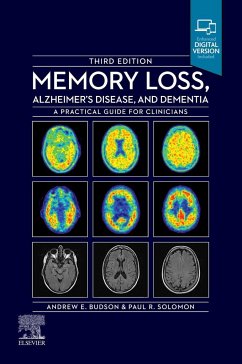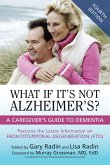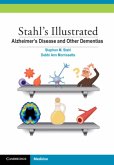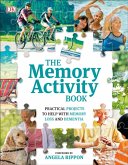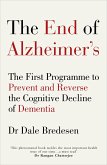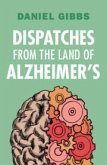Andrew E. Budson (Cognitive Chief & Behavioral Neurology and Assoc, Paul R. Solomon (Williams CollegeWill Department of Psychology
Memory Loss, Alzheimer's Disease and Dementia
A Practical Guide for Clinicians
Andrew E. Budson (Cognitive Chief & Behavioral Neurology and Assoc, Paul R. Solomon (Williams CollegeWill Department of Psychology
Memory Loss, Alzheimer's Disease and Dementia
A Practical Guide for Clinicians
- Broschiertes Buch
- Merkliste
- Auf die Merkliste
- Bewerten Bewerten
- Teilen
- Produkt teilen
- Produkterinnerung
- Produkterinnerung
With a focus on the practical, daytoday tools needed by neurologists, psychiatrists, geriatricians, and others who work with the elderly, Memory Loss, Alzheimer's Disease and Dementia, 3rd Edition, is an indispensable, easytoread resource in this growing area. Clinical experts Drs. Andrew Budson and Paul Solomon cover the essentials of physical and cognitive examinations and laboratory and imaging studies for dementia and related illnesses, giving you the guidance you need to make accurate diagnosis and treatment decisions with confidence
Andere Kunden interessierten sich auch für
![In Pursuit of Memory In Pursuit of Memory]() Joseph JebelliIn Pursuit of Memory20,99 €
Joseph JebelliIn Pursuit of Memory20,99 €![The Storm Keeper's Island The Storm Keeper's Island]() Catherine DoyleThe Storm Keeper's Island7,99 €
Catherine DoyleThe Storm Keeper's Island7,99 €![What If It's Not Alzheimer's? What If It's Not Alzheimer's?]() What If It's Not Alzheimer's?30,99 €
What If It's Not Alzheimer's?30,99 €![Stahl's Illustrated Alzheimer's Disease and Other Dementias Stahl's Illustrated Alzheimer's Disease and Other Dementias]() Stephen M. Stahl (San Diego University of California)Stahl's Illustrated Alzheimer's Disease and Other Dementias74,99 €
Stephen M. Stahl (San Diego University of California)Stahl's Illustrated Alzheimer's Disease and Other Dementias74,99 €![The Memory Activity Book The Memory Activity Book]() DKThe Memory Activity Book25,99 €
DKThe Memory Activity Book25,99 €![The End of Alzheimer's The End of Alzheimer's]() Dr Dale BredesenThe End of Alzheimer's24,99 €
Dr Dale BredesenThe End of Alzheimer's24,99 €![Dispatches from the Land of Alzheimer's Dispatches from the Land of Alzheimer's]() Daniel Gibbs (Emeritus of Oregon Health and Science University)Dispatches from the Land of Alzheimer's18,99 €
Daniel Gibbs (Emeritus of Oregon Health and Science University)Dispatches from the Land of Alzheimer's18,99 €-
-
-
With a focus on the practical, daytoday tools needed by neurologists, psychiatrists, geriatricians, and others who work with the elderly, Memory Loss, Alzheimer's Disease and Dementia, 3rd Edition, is an indispensable, easytoread resource in this growing area. Clinical experts Drs. Andrew Budson and Paul Solomon cover the essentials of physical and cognitive examinations and laboratory and imaging studies for dementia and related illnesses, giving you the guidance you need to make accurate diagnosis and treatment decisions with confidence
Produktdetails
- Produktdetails
- Verlag: Elsevier - Health Sciences Division
- Artikelnr. des Verlages: C2019-0-05193-X
- 3 ed
- Seitenzahl: 336
- Erscheinungstermin: 5. Juli 2021
- Englisch
- Abmessung: 233mm x 189mm x 13mm
- Gewicht: 540g
- ISBN-13: 9780323795449
- ISBN-10: 0323795447
- Artikelnr.: 61187894
- Herstellerkennzeichnung
- Libri GmbH
- Europaallee 1
- 36244 Bad Hersfeld
- gpsr@libri.de
- Verlag: Elsevier - Health Sciences Division
- Artikelnr. des Verlages: C2019-0-05193-X
- 3 ed
- Seitenzahl: 336
- Erscheinungstermin: 5. Juli 2021
- Englisch
- Abmessung: 233mm x 189mm x 13mm
- Gewicht: 540g
- ISBN-13: 9780323795449
- ISBN-10: 0323795447
- Artikelnr.: 61187894
- Herstellerkennzeichnung
- Libri GmbH
- Europaallee 1
- 36244 Bad Hersfeld
- gpsr@libri.de
Andrew E. Budson, M.D. is Chief of Cognitive & Behavioral Neurology, Associate Chief of Staff for Education, and Director of the Center for Translational Cognitive Neuroscience at the Veterans Affairs (VA) Boston Healthcare System, Associate Director for Research at the Boston University Alzheimer's Disease Center, Professor of Neurology at Boston University School of Medicine, and Lecturer in Neurology at Harvard Medical School. He is also the Medical Director of the Boston Center for Memory, located in Newton, Massachusetts. His training included graduating cum laude from Harvard Medical School, being chief resident of the Harvard-Longwood Neurology Residency Program, pursuing a fellowship in dementia at Brigham and Women's Hospital, and studying memory as a post-doctoral fellow in experimental psychology and cognitive neuroscience at Harvard University. Dr. Budson has had government research funding since 1998, receiving a National Research Service Award and a Career Development Award in addition to a Research Project (R01) grant. He has given over 425 local, national, and international grand rounds and other academic talks. He has published over 100 papers, reviews, and book chapters and is a reviewer for more than 40 journals. He has co-authored or edited five books, including Memory Loss, Alzheimer's Disease, and Dementia: A Practical Guide for Clinicians, the second edition of which has been translated into Spanish, Portuguese, and Japanese. He was awarded the Norman Geschwind Prize in Behavioral Neurology in 2008 and the Research Award in Geriatric Neurology in 2009, both from the American Academy of Neurology. His current research uses the techniques of experimental psychology and cognitive neuroscience to understand memory in patients with Alzheimer's disease. In his memory disorders clinic at the VA Boston Healthcare System he treats patients while teaching fellows, residents, and medical students. He also sees patients in Newton at the Boston Center for Memory
SECTION I: EVALUATING THE PATIENT WITH MEMORY LOSS
1. Why Diagnose and Treat Memory Loss, Alzheimer's Disease, and Dementia?
2. Evaluating the Patient with Memory Loss or Dementia
3. Approach to the Patient with Memory Loss, Mild Cognitive Impairment, or
Dementia
SECTION II: DIFFERENTIAL DIAGNOSIS OF MEMORY LOSS
4. Alzheimer's Disease and Mild Cognitive Impairment due to Alzheimer's
Disease
5. Alzheimer's Look-Alikes: Primary Age-Related Tauopathy (PART) and
Limbic-predominant, Age-related TDP-43 Encephalopathy (LATE)
6. Dementia with Lewy Bodies (Including Parkinson's Disease Dementia)
7. Posterior Cortical Atrophy
8. Vascular Dementia and Vascular Cognitive Impairment
9. Primary Progressive Aphasia & Other Disorders of Speech
10. Frontotemporal Dementia
11. Progressive Supranuclear Palsy
12. Corticobasal Degeneration
13. Normal Pressure Hydrocephalus
14. Jakob-Creutzfeldt Disease
15. Chronic Traumatic Encephalopathy
16. Other Disorders That Disrupt Memory
SECTION III: TREATMENT OF MEMORY LOSS
17. Goals of Treatment of Memory Loss, Alzheimer's Disease, and Dementia
18. Cholinesterase Inhibitors
19. Memantine (Generic and Namenda XR)
20. Vitamins, Herbs, Supplements, and Anti-Inflammatories
21. Future Treatments of Memory Loss
22. Physical exercise, Diet, Strategies, and Non-Pharmacological Treatment
of Memory Loss
SECTION IV: BEHAVIORAL AND PSYCHOLOGICAL SYMPTOMS OF DEMENTIA
23. Evaluating the Behavioral and Psychological Symptoms of Dementia
24. Caring For and Educating the Caregiver
25. Non-Pharmacological Treatment of the Behavioral and Psychological
Symptoms of Dementia
26. Pharmacological Treatment of the Behavioral and Psychological Symptoms
of Dementia
SECTION V: ADDITIONAL ISSUES
27. Life Adjustments
28. Legal and Financial Issues
29. Special Issues
ONLINE ONLY APPENDICES
APPENDIX A: Cognitive Test and Questionnaire Forms, Instructions, and
Normative Data
APPENDIX B: Screening for Memory Loss
APPENDIX C: Our Current Understanding of Memory
1. Why Diagnose and Treat Memory Loss, Alzheimer's Disease, and Dementia?
2. Evaluating the Patient with Memory Loss or Dementia
3. Approach to the Patient with Memory Loss, Mild Cognitive Impairment, or
Dementia
SECTION II: DIFFERENTIAL DIAGNOSIS OF MEMORY LOSS
4. Alzheimer's Disease and Mild Cognitive Impairment due to Alzheimer's
Disease
5. Alzheimer's Look-Alikes: Primary Age-Related Tauopathy (PART) and
Limbic-predominant, Age-related TDP-43 Encephalopathy (LATE)
6. Dementia with Lewy Bodies (Including Parkinson's Disease Dementia)
7. Posterior Cortical Atrophy
8. Vascular Dementia and Vascular Cognitive Impairment
9. Primary Progressive Aphasia & Other Disorders of Speech
10. Frontotemporal Dementia
11. Progressive Supranuclear Palsy
12. Corticobasal Degeneration
13. Normal Pressure Hydrocephalus
14. Jakob-Creutzfeldt Disease
15. Chronic Traumatic Encephalopathy
16. Other Disorders That Disrupt Memory
SECTION III: TREATMENT OF MEMORY LOSS
17. Goals of Treatment of Memory Loss, Alzheimer's Disease, and Dementia
18. Cholinesterase Inhibitors
19. Memantine (Generic and Namenda XR)
20. Vitamins, Herbs, Supplements, and Anti-Inflammatories
21. Future Treatments of Memory Loss
22. Physical exercise, Diet, Strategies, and Non-Pharmacological Treatment
of Memory Loss
SECTION IV: BEHAVIORAL AND PSYCHOLOGICAL SYMPTOMS OF DEMENTIA
23. Evaluating the Behavioral and Psychological Symptoms of Dementia
24. Caring For and Educating the Caregiver
25. Non-Pharmacological Treatment of the Behavioral and Psychological
Symptoms of Dementia
26. Pharmacological Treatment of the Behavioral and Psychological Symptoms
of Dementia
SECTION V: ADDITIONAL ISSUES
27. Life Adjustments
28. Legal and Financial Issues
29. Special Issues
ONLINE ONLY APPENDICES
APPENDIX A: Cognitive Test and Questionnaire Forms, Instructions, and
Normative Data
APPENDIX B: Screening for Memory Loss
APPENDIX C: Our Current Understanding of Memory
SECTION I: EVALUATING THE PATIENT WITH MEMORY LOSS
1. Why Diagnose and Treat Memory Loss, Alzheimer's Disease, and Dementia?
2. Evaluating the Patient with Memory Loss or Dementia
3. Approach to the Patient with Memory Loss, Mild Cognitive Impairment, or
Dementia
SECTION II: DIFFERENTIAL DIAGNOSIS OF MEMORY LOSS
4. Alzheimer's Disease and Mild Cognitive Impairment due to Alzheimer's
Disease
5. Alzheimer's Look-Alikes: Primary Age-Related Tauopathy (PART) and
Limbic-predominant, Age-related TDP-43 Encephalopathy (LATE)
6. Dementia with Lewy Bodies (Including Parkinson's Disease Dementia)
7. Posterior Cortical Atrophy
8. Vascular Dementia and Vascular Cognitive Impairment
9. Primary Progressive Aphasia & Other Disorders of Speech
10. Frontotemporal Dementia
11. Progressive Supranuclear Palsy
12. Corticobasal Degeneration
13. Normal Pressure Hydrocephalus
14. Jakob-Creutzfeldt Disease
15. Chronic Traumatic Encephalopathy
16. Other Disorders That Disrupt Memory
SECTION III: TREATMENT OF MEMORY LOSS
17. Goals of Treatment of Memory Loss, Alzheimer's Disease, and Dementia
18. Cholinesterase Inhibitors
19. Memantine (Generic and Namenda XR)
20. Vitamins, Herbs, Supplements, and Anti-Inflammatories
21. Future Treatments of Memory Loss
22. Physical exercise, Diet, Strategies, and Non-Pharmacological Treatment
of Memory Loss
SECTION IV: BEHAVIORAL AND PSYCHOLOGICAL SYMPTOMS OF DEMENTIA
23. Evaluating the Behavioral and Psychological Symptoms of Dementia
24. Caring For and Educating the Caregiver
25. Non-Pharmacological Treatment of the Behavioral and Psychological
Symptoms of Dementia
26. Pharmacological Treatment of the Behavioral and Psychological Symptoms
of Dementia
SECTION V: ADDITIONAL ISSUES
27. Life Adjustments
28. Legal and Financial Issues
29. Special Issues
ONLINE ONLY APPENDICES
APPENDIX A: Cognitive Test and Questionnaire Forms, Instructions, and
Normative Data
APPENDIX B: Screening for Memory Loss
APPENDIX C: Our Current Understanding of Memory
1. Why Diagnose and Treat Memory Loss, Alzheimer's Disease, and Dementia?
2. Evaluating the Patient with Memory Loss or Dementia
3. Approach to the Patient with Memory Loss, Mild Cognitive Impairment, or
Dementia
SECTION II: DIFFERENTIAL DIAGNOSIS OF MEMORY LOSS
4. Alzheimer's Disease and Mild Cognitive Impairment due to Alzheimer's
Disease
5. Alzheimer's Look-Alikes: Primary Age-Related Tauopathy (PART) and
Limbic-predominant, Age-related TDP-43 Encephalopathy (LATE)
6. Dementia with Lewy Bodies (Including Parkinson's Disease Dementia)
7. Posterior Cortical Atrophy
8. Vascular Dementia and Vascular Cognitive Impairment
9. Primary Progressive Aphasia & Other Disorders of Speech
10. Frontotemporal Dementia
11. Progressive Supranuclear Palsy
12. Corticobasal Degeneration
13. Normal Pressure Hydrocephalus
14. Jakob-Creutzfeldt Disease
15. Chronic Traumatic Encephalopathy
16. Other Disorders That Disrupt Memory
SECTION III: TREATMENT OF MEMORY LOSS
17. Goals of Treatment of Memory Loss, Alzheimer's Disease, and Dementia
18. Cholinesterase Inhibitors
19. Memantine (Generic and Namenda XR)
20. Vitamins, Herbs, Supplements, and Anti-Inflammatories
21. Future Treatments of Memory Loss
22. Physical exercise, Diet, Strategies, and Non-Pharmacological Treatment
of Memory Loss
SECTION IV: BEHAVIORAL AND PSYCHOLOGICAL SYMPTOMS OF DEMENTIA
23. Evaluating the Behavioral and Psychological Symptoms of Dementia
24. Caring For and Educating the Caregiver
25. Non-Pharmacological Treatment of the Behavioral and Psychological
Symptoms of Dementia
26. Pharmacological Treatment of the Behavioral and Psychological Symptoms
of Dementia
SECTION V: ADDITIONAL ISSUES
27. Life Adjustments
28. Legal and Financial Issues
29. Special Issues
ONLINE ONLY APPENDICES
APPENDIX A: Cognitive Test and Questionnaire Forms, Instructions, and
Normative Data
APPENDIX B: Screening for Memory Loss
APPENDIX C: Our Current Understanding of Memory

